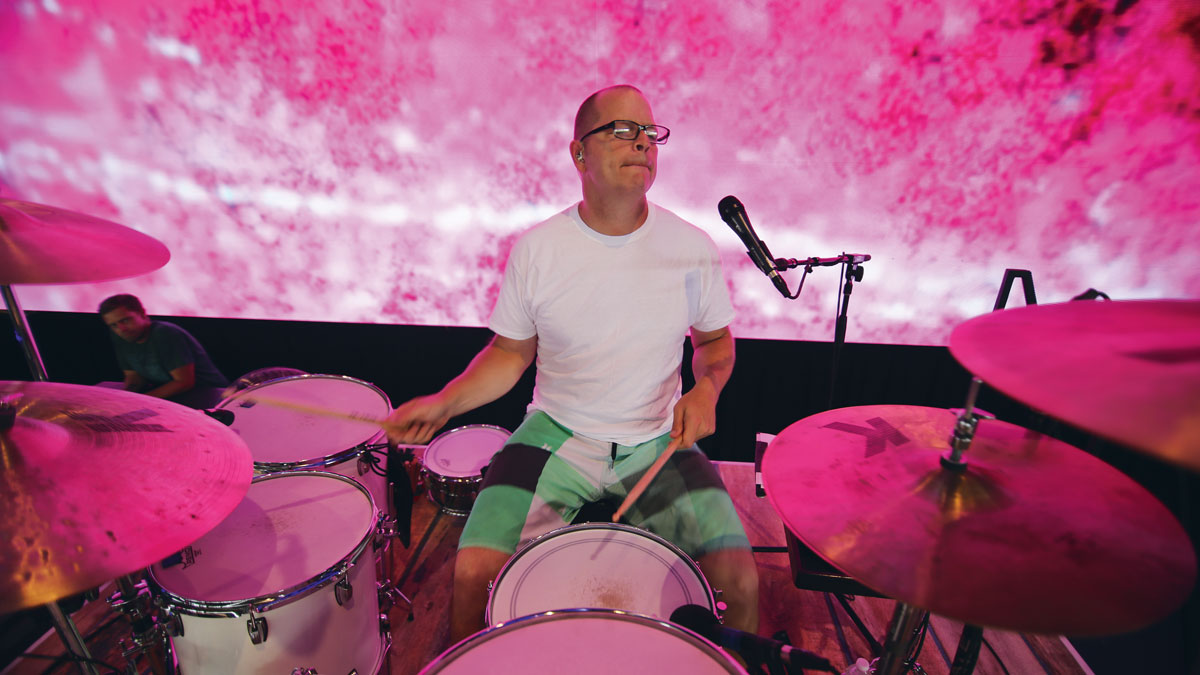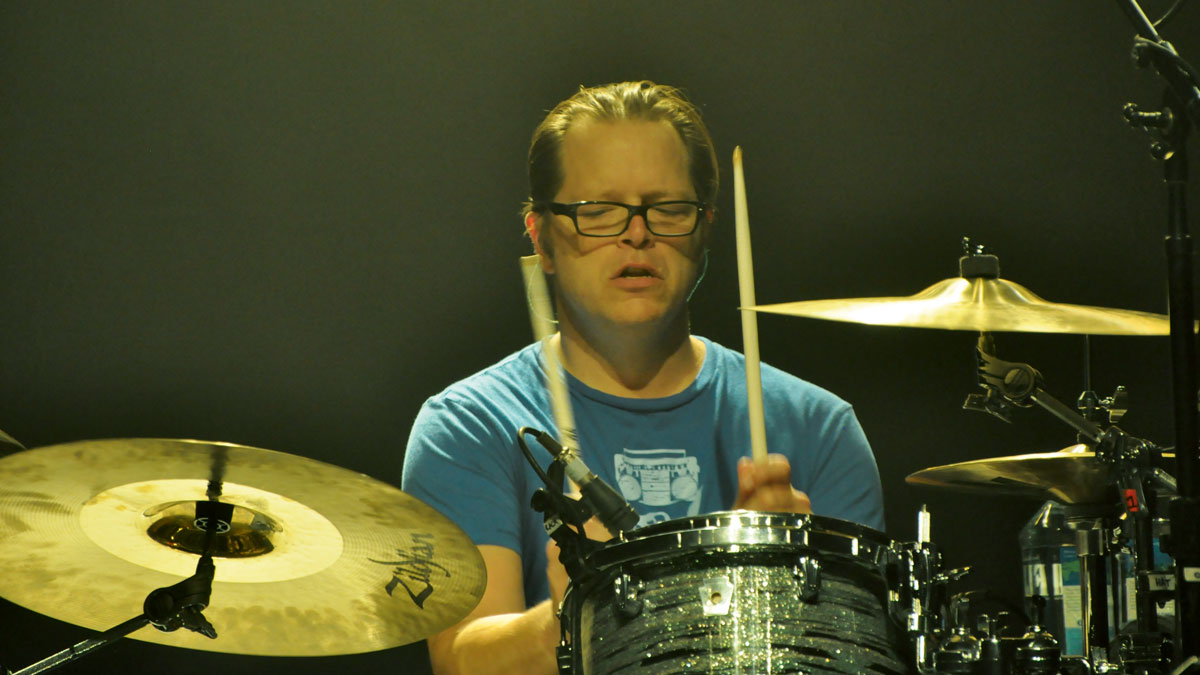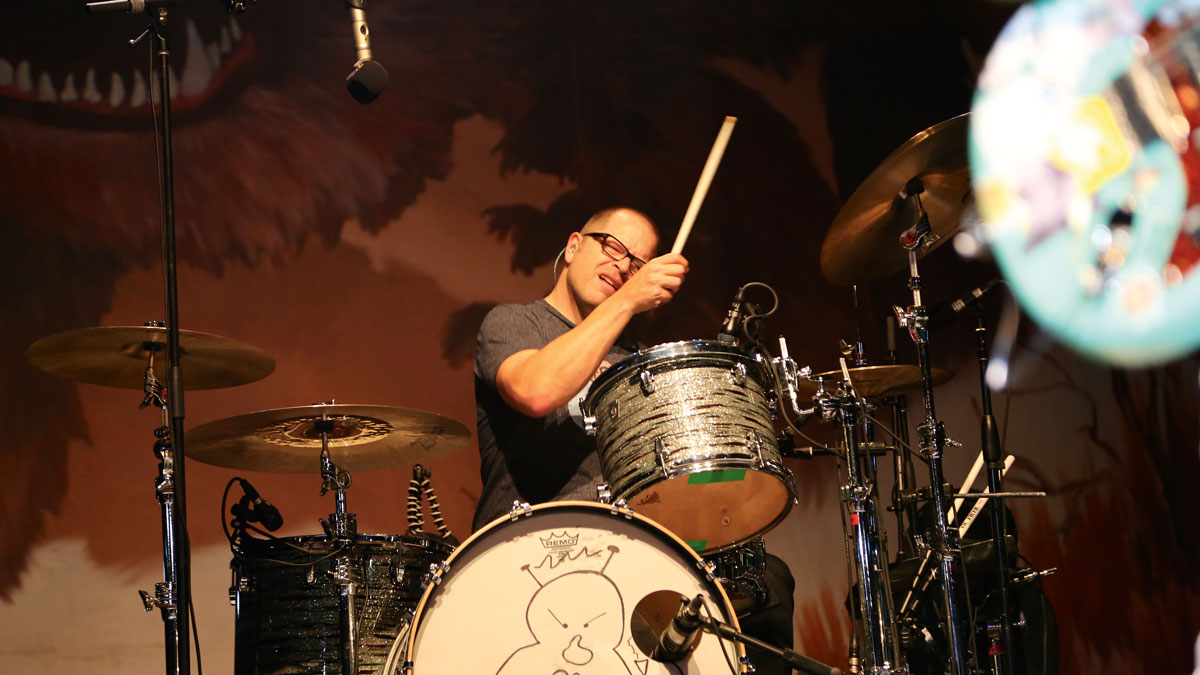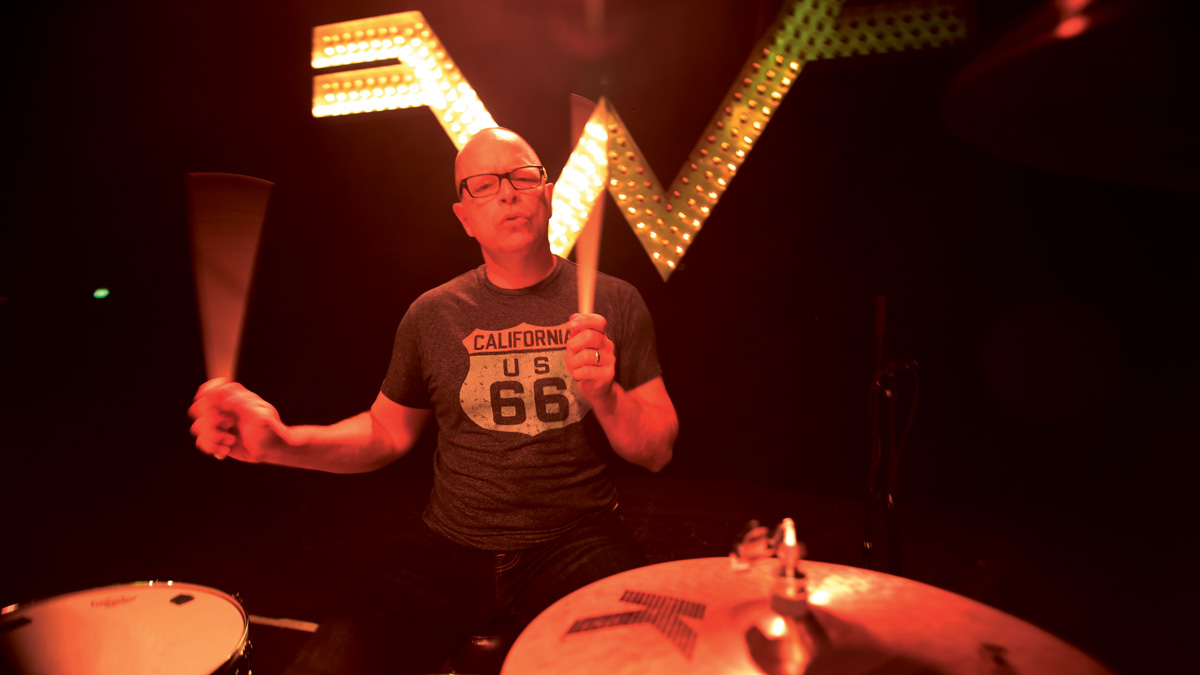Weezer drummer Pat Wilson on the band's past, present and future
Plus, early success, electro beats and Rick Rubin

Early days
Pat Wilson has powered geek rock heroes Weezer for the best part of 25 years.
In doing so he has enjoyed and endured the peaks and troughs of the band’s career, and there have been plenty of those.
Wilson and co were catapulted to megastardom off the back of their classic debut, the Blue album, thanks in no small part to the infectious hooks of, and Happy Days-inspired video for, Buddy Holly.
The achingly simple yet supremely effective drum fill intro of Undone (The Sweater Song) also proved that Wilson had an ear for a cool drum lick. But when follow-up record Pinkerton received a critical bashing (from the same critics who today laud the album as an all-time classic) Weezer withdrew from the spotlight.
They returned with another stunning record in 2001 before going through a mid-career lull and a spate of disappointing records which saw the band dabble, unsuccessfully, with electronics. As you can see, enough twists and turns to bring on a nasty bout of motion sickness. But we’re not done yet, and neither are Weezer.
After being written off once again by the critics they have bounced back in spectacular fashion with their latest, the White album. It turns out there’s plenty of life in these old dogs yet. When we spoke to the Rush-loving, hard-hitting Wilson we found out all about the rollercoaster ride that is a quarter of a century with Weezer.
How did you first get into drumming?
“I had a cousin who was seven years older than me. When he was 14 he would bring over records like 2112 by Rush and Van Halen I and I just really loved music, I can't remember a time when I didn't love it. By that I mean really love it, not just think, 'Oh, music's cool.' So I would constantly listen to these records. I would listen to the drums and think, 'How do they do that?' But somehow I knew what the sounds were, I knew that was the hi hat, that was the snare drum, that was the kick drum. I didn't even have a drum set until I was 19 though. I had two friends with drum kits and I would just play their kits because they weren't that into it [laughs]. I must have been an annoying friend!”
How did joining Weezer come about?
“I moved to Los Angeles in 1990 and somehow just through mutual friends and getting out there meeting people I hooked up with Rivers [Cuomo, vocals/guitar]. He was in a progressive metal band but he wanted to do more songwriting. We kind of kicked around a couple of different things and eventually Weezer came together out of those. It's all pretty unlikely how it all happened but from just playing shows throughout Los Angeles we were lucky enough to catch the ears of some people and it went from there.”
Is it true that you had a 50 song project, where you pledged to write 50 songs before recording?
“I was always like, 'Let's just record all the time,' because I just loved playing. But Rivers was adamant that we needed to write 50 songs before we start to record the best ones. Looking back on it that was probably a good idea.”
We’d say so, as when you did go into record your debut to came out with a classic. It’s also a record with some great drumming moments, like the intro to Undone
“Ha, that's true. I just always started it that way I have no idea where it came from but that became a very identifiable fill. I find that funny. I remember being just so in awe of working with [producer] Ric Ocasek. I loved The Cars, I still do love The Cars, of course, their records are amazing. Just being there with him was so interesting.”
Buddy Holly was the big hit, did you have any idea that song, and its video, would have such an impact for you?
“I had no idea. I know Rivers didn't want it to be on the record. He wanted it to be on the next record, but Ric insisted. Ric also insisted on the little synthesiser line that runs through the verses. I remember Rivers being like, 'I don't know if I want to do this,' but it came out great. The video turned out so well too. What's interesting about the video is that everyone at the time thought we were using a lot of CGI, but I don't believe there is any of that on there. It's all just very clever camera work by Spike Jonze who is a genius.”
That album was a runaway success, was there a feeling that Weezer became very big very quickly?
“There was probably a six month gap between us finishing the record and it actually being released. A couple of months after it was released he managed to get a single played on KROQ in Los Angeles. It actually caught on pretty quick. We did some savvy videos with Spike Jonze. He was so good and he really helped the whole thing to come together. By Christmas it was like, 'Wow, things are really moving along.'”

Highs and lows
Presumably the pressure was ramped up when it came time to record the follow-up, Pinkerton?
“Honestly, for better or worse, I don't ever feel that kind of executive pressure to deliver a product. I'm far more concerned with worrying about if the music is any good or not. Maybe that's because I'm so excited about making an album or maybe it's being selfish or whatever. I know that Rivers takes all of that stuff a lot more seriously than I do.”
Again, you managed to get some nice drum moments onto that record
“That's a very cool record and has a cool drum feel. A lot of people mention that album and say that they love the drum sound and that they love that everything sounds like it's about to explode. When I hear that record now I'll go, 'Wow, it sounds like we were on cocaine or something!' It's cool, that record is a really unique point in the band's history. In terms of songs, I love Tired Of Sex from that record, that is such a fun song to play.”
I never gave a shit what the press thought.
Today Pinkerton is held up as a classic, but at the time it was critically panned
“I never gave a shit what the press thought. It's nice to have nice things written about you though. Hey, I knew something was up and I knew that the fan’s liked that album when we were touring Pinkerton and we would do album tracks, songs that weren't singles like Falling For You and people knew every word. I thought that was pretty cool. The album is quite different from the Blue album so that was really cool. Maybe to the casual fan they wouldn't know the difference.”
The band then went on hiatus. Why was that?
“I think it was just hard for Rivers. He poured so much of himself into writing Pinkerton and he really wanted it to be a success. Ironically today it really is a success. All of the music snobs think that is the greatest Weezer record. It was kind of a weird time for us. Around then nu metal was starting to get big with bands like Limp Bizkit and Korn. I don't know man, I didn't really buy into the cultural relevancy of what we were doing, I just wanted to play drums. It was a weird time, Matt [Sharp, bass] had left the band and it took us a while to figure out what we really wanted to do. Really, to me it feels like it took us until last year to really figure out what we wanted to do.”
You say that, but when you came back with Green in 2001 it was like you hadn’t missed a beat
“We've been lucky ever since then to be able to keep on making records and people still seem to want to be able to come see us play. I can't think of many other bands that came out when we did that are still putting out records and have people wanting to come to see them. It's so humbling.”

Lust for Ludwig
You’ve had a long history with using Ludwig kits, why is that?
“Just about every kit that I've ever had has been a Ludwig! The first drum kit I ever got was a Ludwig Psychedelic Red from the early '70s. Thinking about it now that kit was extremely rare, it wasn't the kind of Psychedelic Red that you usually see. I've been trying to find another vintage one but I've never seen another one for sale. I guess ever since then I've used Ludwig, Ludwig's are cool and they have their own sound.
'I was using a Ludwig kit on [the White] album. I worked on the drums with our producer Jake Sinclair. He had this killer Black Beauty snare and we used that on the whole record except for one song that we tracked at Jake's house. I couldn't have been happier about the whole thing. We got such a fantastic sound, it's definitely my favourite drum sound that I've ever got out of all of our records from down the years.”
You also dabbled with Vistalites in the mid ‘90s and early ‘00s
“Yeah, I had a set of Vistalites as well. I had a blue set but I wound up selling them purely because I guess I just didn't want to play Vistalites anymore, but I did play those for a few years. Right now I play a Ludwig Keystone kit and they just sound fantastic.”
You seem a fan of a natural, organic kit sound
“In general I like to hear the drum parts that people are playing. I like old school bands like Led Zeppelin, Pink Floyd, Van Halen and all of that kind of thing. I think, for me, the more you start deviating away from what the person has actually played, the less interested I become. That's when it starts becoming somebody' else's idea of what you did rather than keeping it pure.”

"A lot of bands, including us, can overthink what it is that were doing."
You’ve also experimented with electronics, particularly around the Red album. Was that a different time for you as someone that is such a fan of organic acoustic kit sounds?
“Well, yeah, that was another weird period. We had been a band for some long and I think Rivers wanted to take it in more of a mainstream direction. For me, as the guy that wants to make stuff that I like, instead of what I think other people like, my whole philosophy is that if I like it other people must like it too. That was a different way for us to go about making records. I won't lie, I wish we had made three more albums like the White album instead of those records. I think that's what we're going to keep on doing from now on. We have lots of energy and there's a lot of excitement about making more records so that's what we're going to do. I think it comes down to that it's always good to try and push in new directions, but it's also good to recognise what it is that is your strength. I think, on balance. The White album is using most of the strengths that Weezer has as a band. On other records maybe there was a lot more experimentation in the approach. On this record all of the cylinders are firing.”
I always feel like we wind up sounding like Weezer no matter what it is that we're doing.
You worked with Rick Rubin on Make Believe and Red. How did you find working with such a renowned producer at that stage of your career?
“I love Rick Rubin and I loved working with him. Let me tell you about Rick Rubin, he has such a good ear for music. It's the exact opposite of what I have. I'm all tactics and I get excited about sounds and parts and the way things feel. But he hears it like the everyman hears it but he's able to talk to the people like me and say, 'Ah, don't do that, do it more like that.' He uses real non-musical ways of talking about it, it's really interesting working with him.”
Even though I loved Rush as a kid and I loved bands that had a lot of shredders in them, I never felt comfortable with that being the message.
What is your approach to writing drum parts? Weezer’s catalogue is littered with musical parts
“I never feel like, even though I loved Rush as a kid and I loved bands that had a lot of shredders in them, I never felt comfortable with that being the message. Mostly to me it's all about the feel of something and having a laid back feel in the cut a little bit. If something has a good feel to it then it makes you want to tap your feet. I think that's what I don't like about a lot of modern music, they want to make it just like a drum machine because then they can point it at and say, 'Hey look, it's perfect, it's perfect.' Well, maybe perfect isn't always the best.”
Are you someone that likes to spend a lot of time crafting drum parts?
“I am. But at some point you just have to let go and stop thinking. A lot of bands, including us, can overthink what it is that were doing. At that point you can't let your creativity flow because you're too worried about connecting the dots. I think it's more fun to sometimes shut that part of your brain off and have someone there overseeing it and let you be free. That way you can let them decide how it fits into the whole. It's very difficult to make a record by yourself. Sometimes artists aren't the best judges of what it is that they do well. Also, if you've got smart people involved, there's a difference between something that is the product of one brain versus some thing that is the product of many brains working in tandem. That's what's cool about being in a band, you get something that you would have never got by working on your own.”
How do you think your playing style has changed during your time with Weezer?
“I used to overthink things and be worried about stuff that really wasn't that important. To me now it is all about the feel, if the feel is good then everything else is good. I don't worry about anything else anymore.”
You seem to have hit harder in your earlier days as well.
“It's interesting, I went through a period where I was just pounding the shit out of the drums. But at some point you go past the sound of the drum that you're hitting and it just doesn't sound as good anymore. If I'm playing at home I play much more dynamically. My favourite drummer of all time is Bill Stewart because he is such a fantastic player but if you watch him play he isn't crushing anything. Even John Bonham, if wasn't crushing the drums, he was just solid. Having said that, I am currently now going for it way more when we play live, it's more like an aerobic exercise for me at this point [laughs].”
The last two Weezer albums - Everything Will Be Alright In The Mind and White - have had a sound more akin to your first two albums. Was that a conscious decision?
“I always feel like we wind up sounding like Weezer no matter what it is that we're doing. As long as it's the people in Weezer playing the songs then it sounds like Weezer. Jake is a big Weezer fan from back in the day though and he was like, 'You guys should sound like Weezer.' Interestingly though for him the important thing for him was the song choices and helping to shape the ways the songs were going to come out. In that regard we were a little bit more disciplined than we were on the last album.”
Rich is a teacher, one time Rhythm staff writer and experienced freelance journalist who has interviewed countless revered musicians, engineers, producers and stars for the our world-leading music making portfolio, including such titles as Rhythm, Total Guitar, Guitarist, Guitar World, and MusicRadar. His victims include such luminaries as Ice T, Mark Guilani and Jamie Oliver (the drumming one).
